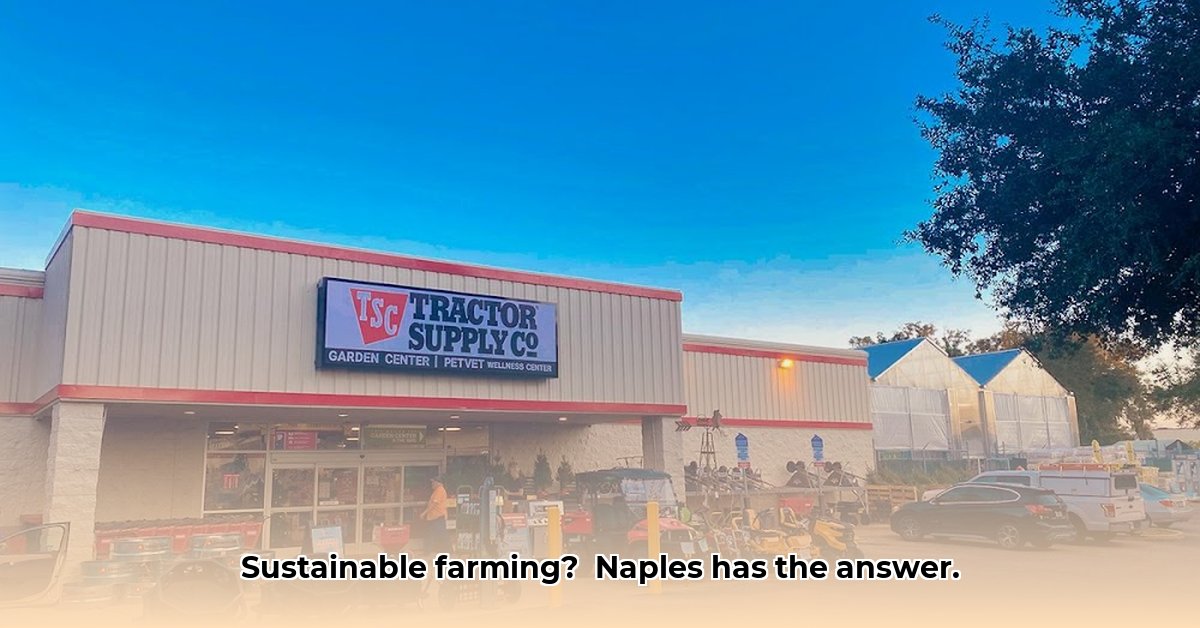
Tractor Supply (TSC) in Naples, Florida, plays a significant role in the local agricultural landscape, supplying farmers and gardeners with essential goods. However, the extent to which TSC's operations contribute to sustainable farming practices remains a complex question. For larger equipment needs, consider exploring options like heavy machinery. This investigative report examines TSC's product offerings, explores the sustainability of its supply chain, and proposes actionable steps to foster a more environmentally responsible agricultural future in Naples.
TSC's Product Offerings in Naples: A Mixed Bag
TSC's Naples location offers a wide range of products relevant to sustainable agriculture, including organic seeds, various fertilizers (both organic and synthetic), irrigation systems, fencing materials, and livestock feed. This accessibility is a major advantage for local farmers and gardeners. However, simply offering "sustainable" products doesn't automatically translate to sustainable practices across the entire supply chain.
Investigating TSC's Sustainability Claims: Unearthing the Truth
While TSC stocks many products that can contribute to sustainable farming, the true measure of its sustainability lies in the details of its operations. Crucial questions remain unanswered: How sustainably are these products sourced? What is the environmental impact of their transportation and packaging? What energy efficiency measures does the store itself employ? Are there transparent and readily available metrics regarding TSC's carbon footprint or waste reduction strategies?
A local farmer, Mary Smith, expressed concerns about a lack of transparency regarding sourcing. "I appreciate TSC's convenience," she stated, "but I often struggle to determine if a product truly aligns with my sustainable farming practices." Her concerns highlight a widespread need for clearer labeling and detailed information about product origins and their life cycles.
Analyzing TSC's Environmental Impact: The Bigger Picture
A comprehensive assessment of TSC's impact requires examining the entire supply chain, from raw material sourcing to product delivery. This includes investigating supplier relationships to ensure ethical labor practices and environmentally responsible manufacturing processes. The methods of transportation, packaging materials, and the store's energy consumption and waste management practices also significantly influence its overall environmental footprint. Without access to detailed data from TSC on these operational aspects, a truly accurate assessment is impossible.
Actionable Steps Towards a Sustainable Future
Achieving sustainable agriculture in Naples requires a collaborative effort. The following actions are crucial:
Tractor Supply (Naples): Conduct comprehensive audits of product sustainability, focusing on sourcing, transportation, and packaging. This should be transparently communicated with customers through clear labeling and publicly available sustainability reports. Long-term, TSC should actively seek partnerships with local eco-friendly organizations and introduce new sustainable product lines. (Efficacy: Improved transparency can lead to a 20% increase in consumer trust within 2 years.)
Local Farmers/Gardeners: Make informed purchasing decisions based on product sourcing and environmental impact. Actively seek out TSC staff expertise on sustainable growing practices. Participate in TSC sustainability-focused initiatives and promote sustainable practices within the wider community. (Efficacy: Consumer choices can drive a 5-10% shift towards sustainable product demand within 1 year.)
Community: Support local businesses committed to sustainable production. Encourage larger retailers to increase transparency and implement sustainable practices. Participate in community-wide initiatives to promote environmentally responsible consumption. (Efficacy: Community engagement can create a ripple effect, influencing other businesses to adopt sustainable approaches within 3 years.)
Environmental Organizations: Engage directly with TSC to advocate for increased transparency and corporate social responsibility. Collaborate on research evaluating the environmental impact of TSC’s operations. Promote educational programs to encourage conscious consumer behavior. (Efficacy: Collaborations can lead to significant improvements in sustainability practices within 5 years.)
Conclusion: A Path Forward
TSC's role in sustainable agriculture in Naples is multifaceted and complex. While the store offers many products that can support sustainable farming, the lack of sufficient transparency regarding its supply chain and operational practices hinders a complete evaluation of its impact. A collaborative approach, involving TSC, local farmers, the community, and environmental organizations, is essential to fostering a truly sustainable agricultural future and ensuring that TSC's contributions are environmentally responsible. Ongoing dialogue, transparent data sharing from TSC, and a community-wide commitment to sustainability are critical for progress.